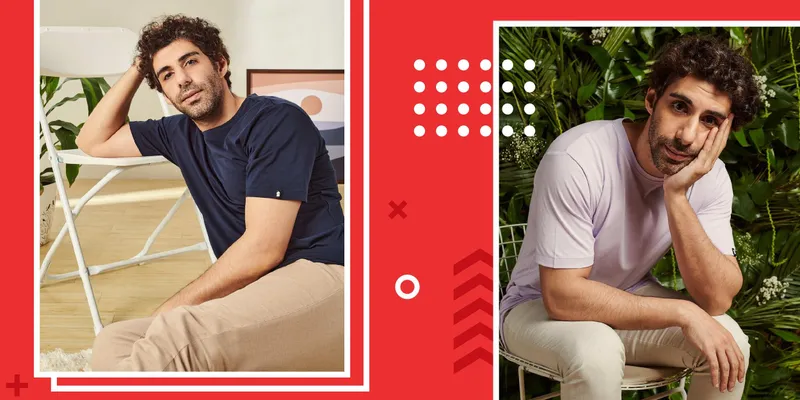
The Souled Store
View Brand PublisherDriving the tee trend: Powering through the pandemic, The Souled Store eyes bigger goals for the future
Ending 2020 on a profitable note, The Souled Store plans to scale ahead by venturing into new categories and more offline stores to score more visibility for the brand.
Designed by US workers in the 19th century by cutting the sleeves of a full suit to survive the heat, the humble t-shirt has evolved over the years to become the perfect fashion choice when you're looking to make a statement, quite literally. While the trend didn’t exist in India until a few years ago, players like The Souled Store have helped in making it a part of mainstream fashion.
From quirky quotes to celebrating unforgettable characters from popular sitcoms like Friends, The Souled Store has given casual t-shirts a stylish makeover with a robust marketing strategy and unique designs.
The startup was founded in 2013 by Vedang Patel, Rohin Samtaney, and Aditya Sharma, who got the idea to launch the label while they were working corporate jobs that weren’t bringing them joy. “We didn’t like what we were doing. We didn’t look forward to our Mondays, and we realised in life there were too many Mondays and you couldn’t go hating them all,” quips Vedang. What started out as a regular conversation between comic book geeks about how fan merchandise was so expensive in India and fans usually had to depend on imported stuff, soon turned into a workable business plan.
Three resignations later, the trio started their entrepreneurial journey by pooling their meagre savings and turning a small apartment into their office.
But how did they decide on the name of the brand? Vedang says that it was by listening to their souls. “We wanted to do something we loved and were passionate about. And the guiding feeling was of following our soul. Being comic book geeks and fans of fictional worlds like that of Harry Potter and Star Wars, we followed our souls and started The Souled Store,” he adds.
Years later, the startup has clocked a turnover of more than Rs 100 crore, shipping over 100,000 orders each month. With a 2+ million customer base and 150+ licences, it is among the biggest brands in India which are selling licensed fashion merchandise.
One can find licensed products from international brands and film studios like Marvel Entertainment, Warner Bros, Disney and WWE. It is currently the official merchandiser of the Indian Premier League (IPL) and Kabaddi franchises, in addition to movie franchises and sitcoms like Batman and Friends. In February 2021, the startup announced that it would be selling official merchandise of Liverpool FC in India as well.
A challenging journey so far
Their journey, however, was riddled with various challenges, starting with the lack of capital. “Starting small is always challenging especially since you’re limited by capital. We had to make sure that we were profitable from Day 1, even though high burn and deep discounting are the norm for the ecommerce industry. We did this through strong unit economics and differentiated designs that you wouldn’t get anywhere else. The fact that our customers were willing to pay a premium for better quality and fit also helped,” adds Vedang.
As word spread about their offbeat designs, they managed to create what Vedang refers to as ‘a cult-like fan following’ which enabled The Souled Store to keep its customer acquisition cost low. “With a focus on data, we also ensured that we had a strong algorithmic approach to inventory management, resulting in less than 45 days of inventory and zero inventory write-offs,” shares the startup co-founder.
In November 2018, venture capital firm RP-SG Ventures Ltd invested ₹21 crore ($3 million) in the bootstrapped startup. Over the years, it has added more products to its garment categories.
When the COVID-19 pandemic struck in March 2020, retail supply chains were affected across the world and hit operations of several brands including The Souled Store, but the startup managed to get back on track thanks to some quick thinking and well-planned strategies.
The Souled Store sources 40 percent of its supply from its inhouse manufacturing unit. “The main reason we have the unit is because we have created a tech-enabled system that allows us to reduce the general lead time of about 60-90 days to 15-20 days. This lowers opportunity losses, stock-outs and helps our products hit the market fast,” explains Vedang. He said that the internal supply helped the startup beat the odds during the pandemic.
“We did not have a labour shortage as we are a people-first organisation and we made sure that our manufacturing team had food, a place to stay if they needed it and their basic salary. We also conducted mental health workshops. This gave us an advantage even as most of the textile industry was reeling under a labour shortage due to the workforce returning to their villages,” he adds.
Talking about the financial impact of the pandemic, Vedang believes that it was the differentiation of products that enabled it to grow and stay profitable in the last 12 months.
Headed to new directions
In 2018, The Souled Store opened three offline stores with the aim of boosting its offline marketing presence. The founders soon realised that opening a store in an area with a high footfall and high visibility was probably the best form of marketing. Vedang says that the stores have been highly profitable, even during the months of partial lockdowns.

Elaborating on the reasons that led to this success, he says, “The main reason is our differentiated designs and high quality products. We have an industry with a 70 percent conversion rate on footfall and know that once a customer walks into our store and has a look at our products, he/she is very likely to place an order. This gives us very real-time feedback for our online business as well.”
The Souled Store plans to open more offline stores in high-visibility locations as they add tangibility and authenticity to an online brand, apart from helping the team create an omni-channel supply and distribution chain. In the future, customers can look forward to being able to buy The Souled Store products in an offline store and exchange it online and vice-versa. “We plan to have 30-40 stores in the next three years that contribute to about 10-15 percent of our overall revenues,” says Vedang.
The future of the business landscape might not appear bright due to the pandemic, but Vedang and his team remain positive, and are busy planning ahead.
The Souled Store will continue leveraging its associations with IPL teams and superhero movies to attract new customers, but aims to expand its range of basics, so that it contributes the lion’s share to the startup's revenue. “We also plan to introduce other categories, like athleisure, innerwear, etc. Given the market size of the apparel industry and the lack of strong competition in the segment, we are confident of crossing an annual revenue of Rs 1,000 crore within the next three years,” he adds.
To know more about The Souled Store’s snazzy collection of casual wear and fashion merchandise, click here.







